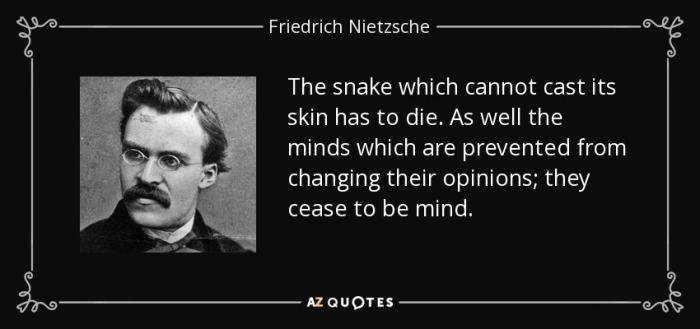
One truism which we often hear is that we learn most from our mistakes, or as Oscar Wilde put it, ‘experience is merely the name (people) give to their mistakes’ but how true is this truism? To answer we must first look at another concept and that is of change. The truth about change is that there is no such thing as change for we/everything are/is in a constant state of flux, indeed there is no such thing as ‘solid’ yet there are moments to which we give the name ‘change’ and then ascribe a value to it.
If change is, as we have said, a constant, then how can a concept such as ‘change’ exist? The answer very simply comes down to perception. As we are attuned/indifferent to our daily changes when something happens which goes against our concept of ‘normal’ we notice it, we go ‘ah, that was different’ even if in the grand scheme of things it isn’t. Once we have noticed this outlier to our usual experience (perception) we then, instinctively, try to find meaning to it and in doing so we ascribe ‘values’ (worth etc.) to it. We say ‘ah, this was a profound change’ and as it has been noticed and given values it seems so, indeed it seems so much so that we, foolishly, think that this is the only change we are experiencing and that it belongs to us alone.
How does this link to learning? Well, as we are constantly undergoing changes we are constantly, be it conscious or unconsciously, learning to adapt to the changes. It can be something innocuous such as a slight shift on a subatomic level which means that our gait is altered slightly which our body adapts to without our conscious awareness. I would argue that 99.9% of the significant changes and learning that we go through we are unaware of and what we notice, and call ‘change’ is cumulative such as water cracking rock. It takes thousands of years of constant change and that level of change is not altered but our perception of it is altered due to a) not being aware of the pervious changes and b) it seeming to be so ‘different’ that we actually notice it and so, to us, the rock has just been smashed by the water even through this could not be further from the reality.
One of my favourite jokes is:
Two fish are swimming. One turns to the other and says, ‘the water is warm today’. The other turns back and says, ‘what is water?’
Many of the great discoveries in the world are things which are obvious, yet they are so obvious that we fail to realise they are there until someone explains them and we go ‘well, obviously…’. Examples of these are Newtonian Gravity, Einsteinian Relativity, The Socratic Method, Tesla’s AC and so on and so forth. The Pre-Socratic philosopher Democritus said that everything was made of ‘atoms’ a couple of thousand years before the scientist J.J Thompson discovered that they were ‘actually’ there. Even then many of the changes which we learn from are things that we already know or that are intrinsically linked to human nature. An example of this is the Atomic Bomb. After it was detonated, Albert Einstein set out trying to make sure it was never used again and to end war. He proposed convening the greatest minds to a council to discuss this issue and wrote to the psychiatrist Sigmund Freud to ask his opinion (read the letters if you can, Freud seems completely at a loss of how to deal with Einstein). Einstein’s argument can be summed up in one quote, ‘a mouse wouldn’t build a mousetrap’. In this Einstein is saying that animals would not build the means of their own destruction, or even consider it a vague possibility, but it is human nature to do so. This is something which we all know but it took the pointless loss of life, leading to the modern world of fear and paranoia, for someone to learn that human nature is flawed and that genocide is not the answer even if these lessons seem to be being forgotten as the geopolitical world slowly starts to return to the state it was in which gave birth to cataclysmic events.
So, from this, we can conclude that change is a constant and post hoc ergo propter hoc learning must be a constant also (discounting Plato’s theory that we knew everything before we were born and learning is just remembering what we once knew). However, there are times when we actually become aware of the change(s) which we are undergoing and once we become aware of them, as with Einstein realising the reality of the A-bomb, we ascribe values upon them and then say ‘ah, we have learnt more from this’ when in actual fact we have not learnt more or less from this than any other learning change, rather we have noticed it, ascribed values to it, and thus creating the illusion that learning, like change, is not a constant.
‘till next time